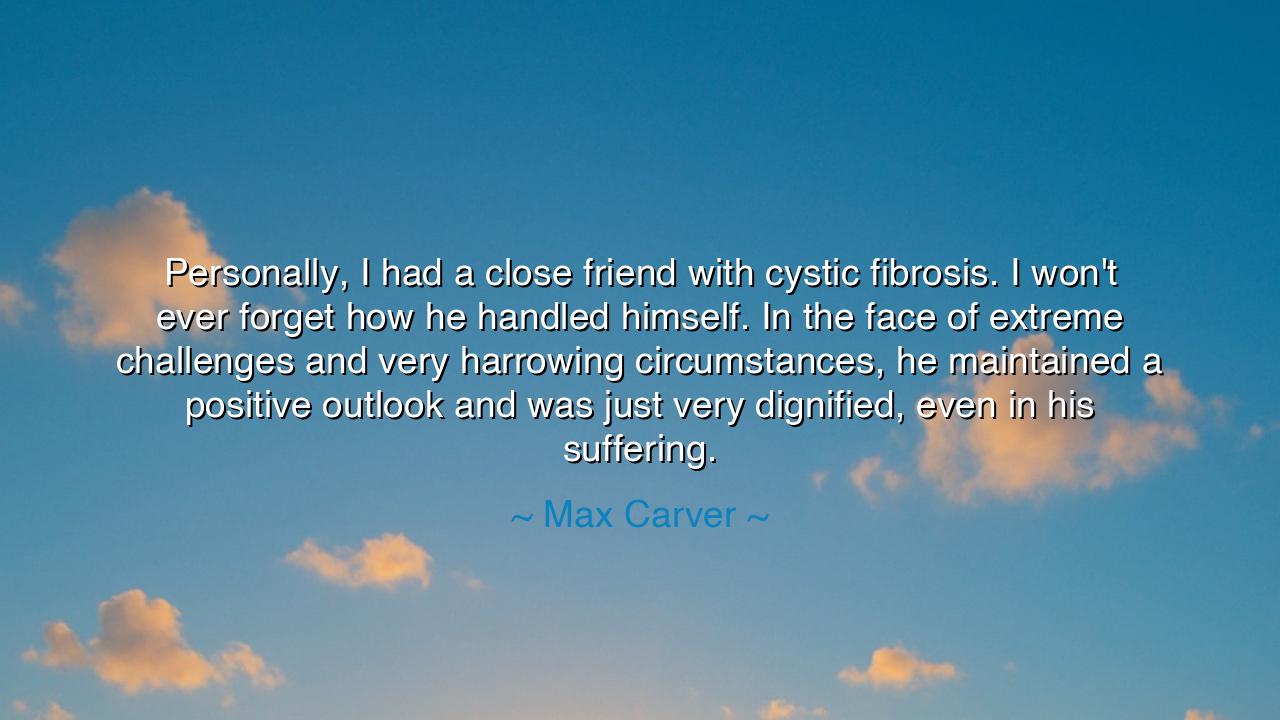
Personally, I had a close friend with cystic fibrosis. I won't
Personally, I had a close friend with cystic fibrosis. I won't ever forget how he handled himself. In the face of extreme challenges and very harrowing circumstances, he maintained a positive outlook and was just very dignified, even in his suffering.






Hearken to the words of Max Carver, who spoke from the heart of friendship: “Personally, I had a close friend with cystic fibrosis. I won’t ever forget how he handled himself. In the face of extreme challenges and very harrowing circumstances, he maintained a positive outlook and was just very dignified, even in his suffering.” In these words lies a treasure of wisdom, for they reveal the hidden strength of the human spirit—a strength that shines not in triumph over ease, but in nobility amidst suffering.
This quote is born of witness, not theory. It is the testimony of one who saw another stand with dignity in the midst of life’s harshest trials. For it is in the crucible of extreme challenges that the soul is tested, and the mask of comfort is torn away. Many collapse under the weight of hardship, but the one who bears sorrow with a positive outlook becomes a beacon, lighting the way for all who behold them. Carver’s friend was such a beacon—teaching, by example, that though flesh may falter, the spirit can remain unbroken.
We find echoes of this truth throughout history. Recall the tale of Epictetus, the philosopher who was born a slave and crippled in body, yet never in soul. Though denied freedom and plagued by suffering, he declared, “You may fetter my leg, but not even Zeus himself can overpower my will.” His life, like that of Carver’s friend, bore witness to the reality that one can maintain dignity even in chains, and hold fast to a noble outlook though the world offers only pain.
So too, think of Anne Frank, who in the terror of hiding and the shadow of death, still wrote of beauty, hope, and the enduring goodness of the human heart. She faced harrowing circumstances beyond imagining, yet her voice refused despair. Her diary, like the memory of Carver’s friend, is proof that suffering need not consume the soul, but can instead draw forth the eternal flame of courage and light.
The meaning here is profound: suffering is not the measure of life, but how one suffers reveals the true measure of the soul. To face pain with bitterness is to let the darkness win. To face it with calm, with courage, with even a spark of positivity, is to transform anguish into strength. Carver’s remembrance of his friend is more than admiration; it is a call to each of us to rise above our trials, to walk with grace, even when our steps are heavy with sorrow.
The lesson is this: life will hand each of us burdens we would not choose. Some will be light, others unbearably heavy. Yet in each moment, we may choose how to carry them. If we carry them with anger, they crush us. If we carry them with dignity, they become the forge that refines us. Thus, let us learn to cultivate patience, gratitude, and hope—not only in fair weather but especially in the storms of existence.
Practical wisdom calls us to action. When faced with trials, take time each day to breathe deeply, to center your mind, and to remind yourself: “I am more than this pain.” Seek also to bring light to others, even in your struggle, for generosity in hardship magnifies the soul. And when you see another enduring their own silent battle, honor them with kindness, with remembrance, and with encouragement, as Max Carver honored his friend.
Therefore, children of tomorrow, carry this truth in your hearts: dignity in suffering is the highest form of victory. For though the body may weaken, the spirit, if steadfast, can inspire generations yet unborn. Let us not waste our sorrows, but let them become the stones from which future paths are laid, that others may walk with hope, courage, and unbroken hearts.






HNminh hau nguyen
I’m curious about the lasting impact of witnessing such resilience. Did Carver’s experience shape his personal values, relationships, or approach to adversity? How do moments of observing dignity and positivity in extreme circumstances inspire action or empathy in those around them? Examining these effects could provide insight into the ripple effect of courage and composure on a broader social and emotional level.
VTNguyen Van Tai
This quote prompts reflection on how positive outlooks intersect with health outcomes. Is the dignity and optimism Carver observed purely a mental or emotional trait, or could it have influenced physical well-being in some way? How can caregivers, friends, and communities encourage and support such attitudes without diminishing the real struggles that chronic illness entails?
BGBhd Gsg
Reading this makes me wonder about the balance between admiration and pressure. While it’s inspiring that Carver’s friend remained dignified, could such expectations inadvertently create a burden for others living with chronic illnesses to always appear strong? Exploring how society frames stories of resilience might reveal both the motivational and challenging aspects of highlighting extraordinary coping in the face of suffering.
KDKieu Diem
I find this account deeply moving, but it prompts reflection on the broader experience of chronic illness. How does society support people with conditions like cystic fibrosis to maintain dignity and positivity, beyond individual effort? Are there systemic barriers that make resilience more difficult, and what can communities do to provide practical and emotional support to those living with life-limiting illnesses?
MAPham Mai Anh
This statement makes me think about the role of role models in difficult circumstances. How can individuals who handle extreme challenges with grace teach others about perseverance and emotional resilience? I’m also curious whether Carver’s friend found specific practices, relationships, or mindsets that helped maintain positivity, and whether these lessons can be shared with others facing similarly harrowing situations.